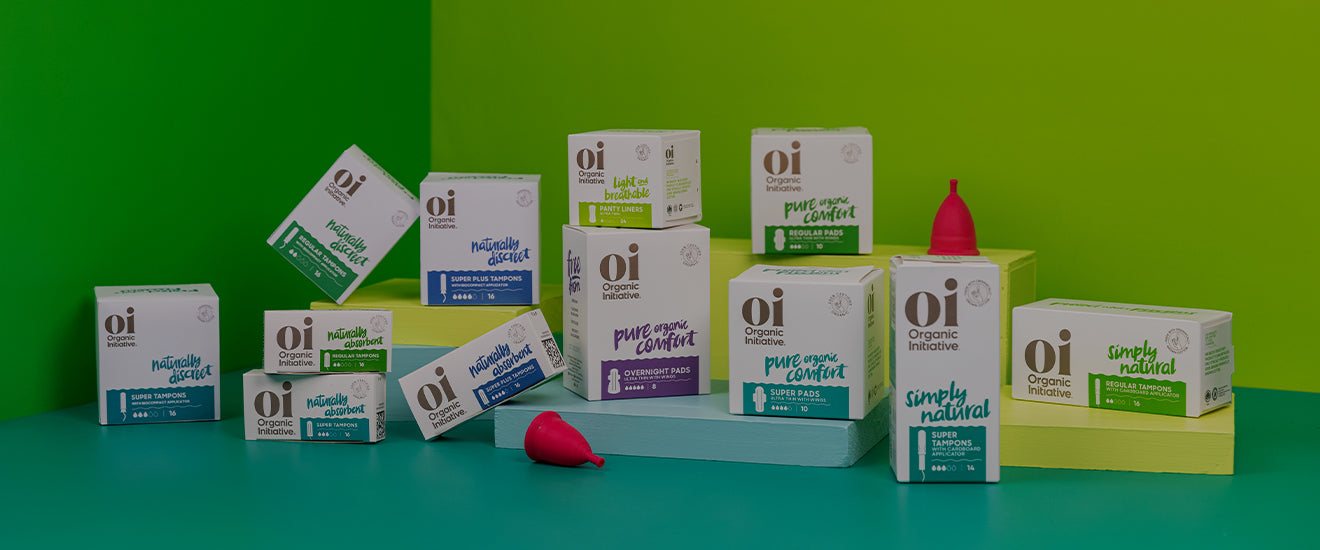
The Environmental Impact of Periods and How to Make Sustainable Choices
Periods, your monthly visitor, the crimson tide… Whatever you call it, menstruation is a natural experience shared by billions across the globe. But with so many people binning pads and tossing tampons, have you ever paused to ponder the environmental impact of periods?
With the typical menstruator using 11,000 to 15,000 pads and tampons in their lifetime, disposable period products are responsible for a staggering amount of waste. And, as most traditional products contain plastic, it’s the kind of waste that sticks around in landfills and the ocean for hundreds (and hundreds) of years.
However, there is some good news! The tide is turning in the period care industry, with savvy consumers demanding more sustainable choices and eco-conscious companies like us rising to the challenge.
To learn how to make more planet-friendly choices for your period – without sacrificing comfort or convenience – read on.
Disposable menstrual products:
a growing environmental concern.
Disposable menstrual products such as pads and tampons are the go-to for most women due to convenience. However, with an estimated 200,000 tonnes of waste generated from menstrual products each year, their environmental impact can't be ignored.
Typically containing plastics and synthetics, these single-use products can take 500-800 years to decompose. And when carelessly disposed of (why are you still flushing?!), they contribute to the mounting problem of plastic pollution in our oceans and landfills.
When plastic-based period products end up in our oceans, they pose a dire threat to marine life. The plastics in these products also break down into microplastics, further contaminating the water and entering our food chain.
What are the eco-friendly alternatives?
Thankfully, there are a growing number of reusable eco-friendly products that can keep you feeling fresh and comfortable during your period. (And, let’s face it, probably a little smug.)
Menstrual cups
Menstrual cups are reusable medical grade silicone or TPE cups that are inserted to collect your menstrual flow – and then emptied and reused. Lasting 3 to 5 years, they’re a comfortable and cost-effective way to minimise your carbon footprint.
Reusable cloth pads
If you pack a canvas tote for the grocery store but use conventional pads, chew on this – each pack you go through contains the equivalent of 5 plastic bags. Cloth pads, on the other hand, are made from absorbent and breathable fabrics such as organic cotton or bamboo. They can be washed and reused, making them a sustainable alternative to disposable pads.
Period underwear
Period undies are designed with built-in, blood-absorbing layers. They’re reusable, comfortable and a good option for those seeking convenience and sustainability. Just pop them in the wash and reuse them like your regular knickers.
Eco-friendly disposable products are also available.
If you prefer disposable options, that’s totally fine. Plastic-free organic period care products are increasingly popular and provide a healthier and more natural choice – for you and the planet.
Organic pads and tampons
Most tampons are made from synthetics like rayon and viscose and contain chlorine-bleaches and dyes. Organic tampons, pads and liners are menstrual products made from organic and natural materials, such as organic cotton, bamboo or plant-based fibres. Unlike conventional products, they’re free from toxic chemicals, pesticides and synthetic fragrances.
Produced via sustainable farming practices that minimise the use of water and energy, organic options are better for the environment. What’s more, they’re gentler on your intimate parts as they don't contain harsh chemicals that can cause irritation or allergies.
However, beware of greenwashing, as many ‘organic cotton’ period products still contain plastic – but not ours! Biodegradable and 100% plastic-free, Oi disposable period pads and tampons break down naturally in around 5 years under the right conditions. Made with non-toxic certified organic cotton, they’re gentle on your body and the environment.
Bin it, don’t flush it! How to properly dispose of period products.
If you are using disposable products, wrap them in toilet paper or a biodegradable bag before disposing of them in the garbage bin. Avoid flushing them down the toilet at all costs, as they can clog sewage systems and contribute to pollution.
Be an agent for positive change. Period.
While it's tempting to go with the flow and stick with what you know, switching to eco-friendly disposable products or reusable alternatives is an easy way to minimise our ecological footprint. So, let's come together and turn the tide on period waste!

No Greenwashing.
Period.